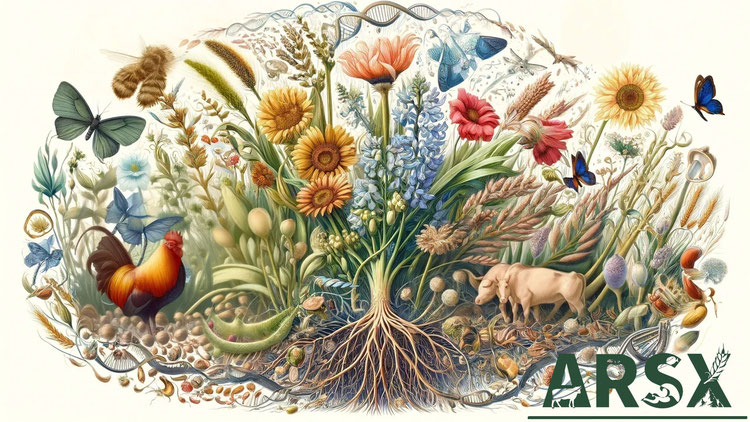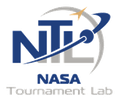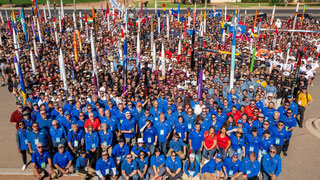!!Submission Deadline - Monday, June 24th!!
This is an internal challenge for the Agriculture Research Service (ARS), United States Department of Agriculture (USDA). Team captains must be an ARS scientist or post-doctoral researcher. External collaborators are permitted only on ARS-led teams. Please see the Rules section below
The theme for ARSX2024 is Safeguarding Sources Challenge: A Quest to Sustain Genetic Diversity, a challenge that beckons a convergence of minds from across the spectrum of science, technology, and beyond. This year, we are exploring innovation across disciplines to offer an opportunity for fresh ideas and revolutionary approaches to sustain and enhance the genetic diversity of plants, animals, and microbes. Your expertise, whether in biotech, artificial intelligence, ecology, or data analytics, has the power to shape the future of agriculture through our four pivotal subcategories:
- Advanced Collection Techniques: : Tackle the challenge of accessing and securing a diverse genetic repository from a plethora of environments. Your engineering skills could revolutionize how we collect genetic resources, ensuring a broader and more resilient genetic base for agriculture. Leverage drone technology, or remote sensing, and AI-driven discovery tools (as examples) to identify and gather novel genetic specimens from uncharted terrains, ecosystems, and animal populations.
- Sophisticated Management Systems: Address the complexities of genetic resource management, including material regeneration, crucial for maintaining seed and germ viability over time. Your expertise in software development and data science could create the platforms needed to safeguard and efficiently utilize these vital resources. Utilize blockchain for traceability, AI for data management, and cloud computing to create dynamic databases (as examples) that not only store but also intelligently manage the vast array of collected genetic information.
- Innovative Characterization Methods: Confront the challenge of identifying and cataloging traits from genetically diverse populations under changing environmental conditions. Your work in genomics, bioinformatics, or robotics could unlock the mysteries of genetic traits, leading to crops and livestock that are more resilient, nutritious, and adaptable. Apply cutting-edge genomics, phenotyping robots, and machine learning algorithms (as examples) to characterize the genetic resources with unprecedented accuracy and speed.
- Revolutionary Preservation Techniques: Address the challenge of preserving genetic integrity over extended periods. Innovators in materials science, chemistry, and synthetic biology could forge the path to ensuring the longevity and accessibility of these genetic treasures for future generations. Explore not only the potential of cryopreservation, synthetic biology, and nanotechnology (as examples) to develop new ways to preserve plant, animal, and microbial genetic materials, but also radical new ideas that could fundamentally change how we think about and implement the preservation of genetic diversity.
As you contemplate your entry into this multidisciplinary quest, envision the fusion of your domain expertise with these subcategories. If you have a great idea that doesn’t quite fit these subcategories, but still fits the challenge goal of preserving and safeguarding germplasm, you can select Other on your submission. The challenge is not just to sustain genetic diversity in agriculture but to redefine it through the lens of innovation and interdisciplinary collaboration. If the prospect of shaping the future of food systems with your unique insights excites you, click "Follow Challenge" and be a part of this transformative journey.
This challenge will award up to three teams submitting the most compelling proposals up to $100,000 each to demonstrate proofs of concept for their ideas. If you’ve had a bold and/or unconventional idea in this area in the back of your mind, now is the time to act!
In ARSX2024, the teams submitting the 10 most compelling ideas will be selected as Phase 1 winners (finalists). These teams will have several weeks to participate in an innovation forum, to refine their ideas, and to build out their pitches. At the end of Phase 2, finalists will present their pitches to a panel of judges and an audience of their peers and colleagues. The judges will award up to $100,000 each to the top three teams.
In addition to the three $100,000 prizes, this challenge offers participants a chance to build new relationships across disciplines and geographies, and Phase 1 winners will have access to both group and individual pitch coaching.
Sustaining Genetic Diversity in Agriculture underpins the resilience of our food systems against challenges such as climate change, pests, and diseases. It is the cornerstone of agricultural innovation, enabling the development of crops that can thrive under various environmental conditions while meeting the growing global demand for food. However, achieving the full potential of maintaining genetic diversity in agriculture is a difficult, multifaceted problem. Germplasm, the focus of this year’s challenge, refers to any type of cell, tissue, or organ from plants, animals, or microbes that can be preserved, revived, and utilized for repopulating species or for genetic and genomic research. Current technologies and methodologies for genetic characterization and preservation are often limited by scalability, cost, and complexity, necessitating innovative breakthroughs that can democratize access to genetic technologies and enhance global food security. The USDA is therefore calling for innovative approaches from all applicable domains to preserve these vital resources. Innovation in germplasm collection, preservation, and management involves disruptive technologies and methods that could streamline or consolidate traditional methods.
ARSX2024 underscores the necessity of interdisciplinary approaches to solve complex problems in agriculture, integrating fields such as data science, ecology, biotechnology, and materials science. We are on the lookout for pioneering ideas that transcend traditional boundaries—whether it’s through engineering ingenuity to revolutionize how genetic resources are collected and preserved, manufacturing innovations that redefine resource management, or cutting-edge data science and computer vision techniques that bring new perspectives to the characterization and taxonomy of genetic diversity. Imagine leveraging your unique expertise, whether in developing smart algorithms for data analysis, employing novel materials for gene storage, or designing disruptive technologies for resource tracking, to contribute to a future where genetic diversity in agriculture is not just maintained but thrives. We invite you to explore how your field of work, even if not directly related to genetics, can offer novel solutions to safeguard and enrich our agricultural heritage for generations ahead.
A significant facet of the challenge is developing agricultural systems that are resilient to climate change, utilizing genetic diversity as a cornerstone for developing crops and livestock that can withstand extreme weather conditions and changing environmental factors. By focusing on these key areas, we invite proposals that not only safeguard genetic diversity but also contribute to creating more resilient, productive, and sustainable agricultural systems. We are looking for high-risk, high-reward, creative research proposals that bring together expertise from across scientific disciplines to address these challenges in innovative ways.
Join ARSX2024 - Safeguarding Sources Challenge: A Quest for the Future of Genetic Diversity in Agriculture and bring your ideas to the forefront of agricultural science. This challenge is open to all ARS scientific staff, embracing bold, aspirational ideas that may pave the way for groundbreaking advancements in agricultural genetics. Whether your proposal is the seed of a transformative concept or a leap towards a sustainable agricultural future, ARSX2024 offers a platform for uncommon scientists with uncommon ideas to make a significant impact. If your vision aligns with our quest to harness the power of genetic diversity for the next era of agriculture, we invite you to submit your proposal. Let’s collaboratively embark on this journey to shape the future of agriculture through the lens of genetic innovation. (Hint: We believe this challenge is an opportunity for all ARS scientific staff to showcase their ingenuity.)
Challenge Breakthrough
Genetic diversity is the cornerstone of agricultural resilience and innovation, and it’s calling for your expertise. ARSX2024 seeks to harvest groundbreaking ideas and technologies from every corner of science and engineering to redefine the preservation, management, and understanding of genetic resources in agriculture, covering both plant and animal species. Facing the challenges of environmental shifts and the imperative for sustainable farming practices, this challenge invites you to apply your unique insights and tools—whether from AI, robotics, materials science, or beyond—to foster a new era in agriculture. Let's collaborate to create smarter, more sustainable systems for managing our planet's precious genetic diversity.
The Challenge
Building on USDA's legacy of safeguarding agricultural genetic diversity through the Germplasm Resources Information Network and its partnerships, we now extend an invitation across disciplines for innovative approaches to genetic resource sustainability. This year's challenge shifts the focus towards harnessing cutting-edge science and engineering, inviting experts to reimagine how we collect, manage, characterize, and preserve the foundation of our food systems, emphasizing both flora and fauna. In this endeavor, the USDA seeks to merge tradition with innovation, ensuring the resilience and richness of our agricultural heritage for future generations.
How do I Win?
- This challenge is open to ARS personnel led teams only. Team captains must be scientists or post-doctoral researchers.
- External collaborators are permitted only on ARS-led teams. Please see the Rules section below.
To secure victory in the ARSX2024 challenge, you'll provide a comprehensive submission process designed to gauge your team's innovative capacity and readiness to tackle crucial agricultural challenges. You'll detail your team's composition, showcasing the diverse expertise and unique skills each member brings to the table. This information is pivotal in highlighting the interdisciplinary nature of your approach, underscoring the collaborative effort behind your proposal. For teams incorporating external collaborators, especially those from beyond U.S. borders, it's crucial to ensure compliance with all relevant regulations, emphasizing the challenge's inclusive and global outlook.
Your submission will then delve into the heart of your proposed solution, providing a compelling overview that encapsulates the essence of your idea, its potential impact on enhancing genetic diversity in agriculture, and the innovative spark that ignited your team's vision. You will be asked to articulate how your approach stands out in its novelty, feasibility, and potential to revolutionize the management and preservation of genetic resources, aligning closely with the challenge's focus areas and meeting rigorous judging criteria.
Moreover, you'll detail the anticipated impact of your proposal, exploring its potential and the creative novelty that sets it apart from existing solutions. A feasibility analysis will offer evidence of your idea's viability, outlining critical milestones, and addressing potential challenges to adoption.
Finally, the collaboration segment will prompt you to reflect on how your team's collective expertise is poised to evolve, ensuring an effective approach to project implementation. To bolster your submission, you have the option to include supplementary materials, providing additional evidence and insights that underline the strength and depth of your proposal.
This narrative-driven submission process is not just about fulfilling entry requirements—it's an opportunity to tell the story of your idea, from conceptual spark to potential real-world impact, inviting judges to envision the future of agricultural innovation through your team's eyes.
How did previous ARSX participants benefit from the process?
Previous ARSX awardees all cite the ability to connect and collaborate with other ARS scientists across diverse geographies and disciplines as one of the top benefits. We hear repeatedly that ARSX gives individuals an opportunity to build teams and work with others that they wouldn’t normally. Many teams plan to continue their collaborations into future research endeavors. Whether participants, finalists, or awardees - they all appreciate the opportunity to pursue different ideas with different collaborators. Another aspect of ARSX that gets a lot of positive feedback is the pitch coaching that finalists receive. This training in non-technical pitching is an opportunity to build skills that can be essential to successfully communicating your ideas and projects.
The ARSX Team will be hosting weekly office hours to discuss ideas and help answer challenge questions. Additionally, be sure to check out the Challenge Forum to engage with fellow participants, see what kinds of questions are coming up, and engage with the discussions happening around ARSX2024.
- The ARSX2022 innovators showcased a wide array of creative solutions aimed at propelling agriculture towards a circular economy, emphasizing the reuse and repurposing of resources to achieve sustainability. Among the winners, Joseph Krystel, Michelle Heck, Robert Shatters, Scott Adkins, Matt Ajemian, Krishna Kannan, Marco Pitino, and Lauren Shrum stood out with their Novel Therapeutic Minibody Production Platform, focusing on leveraging marine rays for the innovative production of minibodies with applications in therapy and agriculture. Their participation reflects the competition's spirit of fostering novel ideas and interdisciplinary collaboration. Another winning team led by James McManus, Gabriel Patterson, William Hart-Cooper, Bill Orts, Dane McSpedon, and Kaj Johnson impressed with their Universal Waste Conversion for Circular Economy project, aiming to transform waste into valuable biochemicals and bioplastics, showcasing the potential of waste as a resource. Evan Wegener, David Compton, and Mike Jackson’s project on Bio-based Chemicals from CO2 and Paper Pulp Waste highlighted the innovative conversion of CO2 and pulping byproducts into biodegradable materials, underscoring the competition’s goal of turning environmental challenges into opportunities. Each winning team’s unique approach not only addressed key sustainability issues but also embodied the ARSX2022 theme of innovating for a sustainable future, echoing the competition’s emphasis on creativity, impact, and the pursuit of groundbreaking agricultural solutions.
- The ARSX2021 visionaries all approached greenhouse gas reductions in different ways, but every team mentioned the pleasure of building new teams and having a place to pursue different ideas. Bryan Emmett, Claire Phillips, Ryan Hayes, Rod Venterea, and Florence Sessoms won for their approach to developing biological nitrification inhibition (BNI) in cover crops as a cost-effective and climate-resilient N2O mitigation solution. They noted many positive aspects of participating in ARSX. In addition to team building and pitch coaching, they also enjoyed being able to use the ARSX platform as a way to develop and further their idea and being able to engage with ARS administrators. Dan Martin and his team proposed a novel technique to enhance rainfall from convective clouds by releasing electrically charged water droplets into clouds. They were thrilled to have been selected as one of the three ARSX2021 winning teams, but what they really valued was the journey through the competition process.
- In ARSX2020, winners Robert Shatters, W. Rodney Cooper, and Michelle Heck leveraged their innovative Plant-Host Activated-Cell Transplantation (PHACT) technology to advance agricultural pest and pathogen management across USDA sites, benefiting from the ARSX framework to foster interdisciplinary collaboration and team unity. Just 4 years later, their project is in field trials! Their ARSX success played a pivotal role in securing a significant NIFA SCRI ECDRE grant. Additionally, Vincent Ricigliano's ARSX recognition led to a nomination for a young investigator’s award, further enabling his research on feed-based therapeutics. Recently published in Nature Sustainable Agriculture
If you are selected as one of the 10 finalists, you will be invited to participate in the ARSX Final Event. This will be your opportunity to refine and strengthen your idea by getting input from relevant subject matter experts, by possibly building out your team to address gaps, and by receiving both individual and group pitch coaching. At the end of the Innovation Forum and training period, you will pitch your idea to a panel of judges and an audience of your peers and colleagues. The judges will select up to three winners, and each winner or winning team will receive up to $100,000 to demonstrate proof of concept for their ideas. Depending on the outcomes from initial work on winning ideas, there is the possibility for some of them to become funded research projects.
The goal of ARSX is to encourage ideas and collaborations that are outside the box and possibly quite early stage, so your ideas will be evaluated primarily based on their potential impact and overall novelty. Secondary criteria include feasibility of the proposal. We encourage participants to collaborate and form partnerships across ARS program functions and outside of ARS. While collaboration and partnerships are not required, we have seen success from teams who come together and bring diverse thinking to their submissions.
See the Judging Criteria section for more details.
Prize
Up to 10 Phase 1 finalist teams will be eligible to participate in an innovation forum to refine their original ideas, build out their teams, and receive pitch coaching. This is a unique opportunity to interact with colleagues from other parts of the organization, to get visibility within ARS, and to develop some new skills.
Up to 3 Phase 2 winners will each receive up to $100,000 to support proof of concept work on winning ideas.
Additionally, all participants will benefit from the ARSX experience. Submitting your idea to ARSX2024, will afford you the following:
- Opportunity to get your idea reviewed by experts outside of ARS (external evaluation panelists include experts, entrepreneurs, and innovators with perspectives that are outside of agriculture)
- Visibility both within and outside of ARS.
- Additional funding opportunities from the Innovation Fund Panel that are only open to ARSX2024 participants
Participation Eligibility:
The challenge is open to all ARS personnel, but team leaders/captains must be ARS scientists or postdoctoral researchers. External collaborators are permitted on teams led by an eligible ARS team captain. External collaborators may originate from any country, as long as United States federal sanctions do not prohibit participation. To determine if any federal sanctions apply, team leaders/captains must check with the Office of International Research Engagement and Cooperation (OIREC). Please contact the OIREC international affairs specialist assigned to the external collaborator’s country (see: https://www.ars.usda.gov/office-of-international-research-engagement-and-cooperation/regional-contacts/ )
Please note that participant and applicant are used interchangeably.
Submissions must be made in English. All challenge-related communication will be in English.
No specific qualifications or expertise in the fields of agriculture, nutrition, or climate change is required. Prize organizers encourage individuals and cross-disciplinary teams to compete and propose new solutions.
Ownership of Intellectual Property:
ARS will be responsible for filing patents and IP protection for innovations created by employees and affiliates of ARS. Non-ARS judges and participants will need to sign a non-disclosure agreement (NDA) prior to accessing information submitted in an application. Participants can be assured that any IP, whether granted or contained within a provisional application, will be protected through the application and review process of the competition.
Applicant will retain all right, title and other ownership interests in Applicant Inventions and Applicant Copyrighted Works. Applicant will also retain all right, title and other ownership interests in Applicant’s submission and in all inventions, patents, patent applications, designs, copyrights, trademarks, trade secrets, software, source code, object code, processes, formulae, ideas, methods, know-how, techniques, devices, creative works, works of authorship, publications, and/or other intellectual property not included in the definition of Applicant Technology (“Intellectual Property”) developed by Applicant during the Challenge. Your own employment agreement is still in effect.
Selection of Winners:
Based on the winning criteria, prizes will be awarded per the Judging Criteria section above. In the case of a tie, the winner(s) will be selected based on the highest votes from the Judges.
Additional Information:
By participating in the challenge, each competitor agrees to submit only their original idea. Any indication of "copying" amongst competitors is grounds for disqualification.
All applications will go through a process of due diligence; any application found to be misrepresentative, plagiarized, or sharing an idea that is not their own will be automatically disqualified.
All ineligible applicants will be automatically removed from the competition with no recourse or reimbursement.
No purchase or payment of any kind is necessary to enter or win the competition.
Void wherever restricted or prohibited by law.












